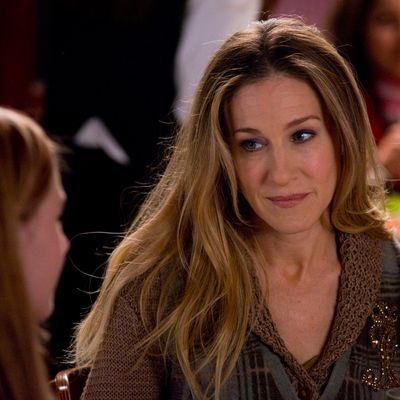
Come back, Leap Year, all is forgiven. Garry Marshall’s latest makes you miss other, more mundanely lame romantic comedies of recent vintage. The cloying absurdity of The Bounty Hunter or the fevered earnestness of Couples Retreat may not be much, but they feel refreshingly focused and involving next to New Year’s Eve and its kaleidoscopic mishmash of plots and stars.
This new one brings together a wide array of New Yorkers going about their various wacky/sensitive/ironic tasks/catastrophes/meet-cutes on the titular date. So we get Hilary Swank as a newly appointed official charged with making sure the Times Square ball drop goes perfectly (it doesn’t). Elsewhere, mousy music industry peon Michelle Pfeiffer quits her job and appoints bike messenger Zac Efron to help her fulfill her New Year’s resolutions. Meanwhile, rich, tuxedo-clad Josh Duhamel rushes to try to make it back into the city from a Connecticut wedding and winds up hitching a ride in a van with a boisterous, average family (which can only mean one thing: Profane Grandpa Alert!!).
There’s more. While that’s happening, lovesick rocker Jon Bon Jovi carries the torch for top chef Katherine Heigl. In the meantime, Jessica Biel and Seth Meyers struggle in a city hospital to birth the first baby of the New Year and win a large jackpot, while nurse Halle Berry keeps company with a dying Robert De Niro (some credit where it’s due: he looks terrible), who wants to see one last New Year’s Eve. And then there’s Ashton Kutcher, who gets stuck in an elevator with Lea Michele. There are a couple more story strands, and certainly more stars, but I’ve run out of creative ways to say “meanwhile.” Seriously, it’s like a talent agency exploded in midtown.
This sort of comic roundelay is certainly nothing new and can lead to sublime results. But Grand Hotel this ain’t. Marshall and screenwriter Katherine Fugate jump between situations so breathlessly that you realize it’s because they can’t be bothered to develop the characters or situations in any meaningful way; the movie is on the run from itself. With such little conflict and even less resolution, the actors are left flailing.
A couple of bright spots do shine through. Amazingly, there seems to be a real spark between Pfeiffer and Efron. For once, the actor’s oddly charming disingenuousness feels right for the part, while her iciness, de-glamorized, lends her a quiet vulnerability. You find yourself pulling for them which in turn might make you resent the movie more, because you want to see more of them. And Berry, to her credit, brings more feeling to her part than the film seems willing to let her have. But that’s about it. Shorn of her trademark intensity, Swank seems lost in a soft focus role; one wonders if Julia Roberts bailed at the last minute. Bon Jovi, who was once so flamboyant as a rocker, wears a dim, placid half-smile in all his scenes. At one point, someone mentions that his character is feeling sad, and the cutaway to the actor wearing the same expression he’s had for the entire movie is the biggest (unintentional) laugh in the whole thing.
Such breathlessness spent on so little might have still been redeemed if New Year’s Eve had a few good (intentional) jokes, some lively atmosphere (it doesn’t even really feel like it’s happening in New York, though it was shot here), or if it ever bothered to build up a romantic head of steam. But in its frantic, inane need to keep moving, any actual energy the film might have had dissipates. A movie that’s supposed to have something for everybody winds up having nothing for anybody.


